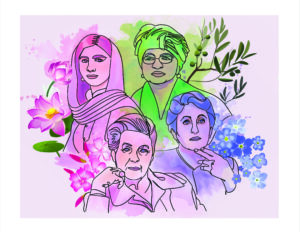 In Canada, and many parts of the so-called developed world, we often hear that the fight against sexism is obsolete and that feminists are fighting a battle that has already been won. After all, women can vote, own property, and the wage gap is a myth. What more could they want? On our campus, clubs advocating for women’s inclusion in fields like commerce,
In Canada, and many parts of the so-called developed world, we often hear that the fight against sexism is obsolete and that feminists are fighting a battle that has already been won. After all, women can vote, own property, and the wage gap is a myth. What more could they want? On our campus, clubs advocating for women’s inclusion in fields like commerce,
STEM, and politics are questioned for not serving a real purpose. As a female-identifying student entering my final year of an international relations and politics degree, I feel qualified to speak to the level of exclusion that women and people of non-dominant genders face in the field and why women’s inclusion in politics remains a problem everywhere.
Men dominate politics. 50 percent of the world’s population represent a meagre nine percent of its leaders. It is essential to start with figures, as many men entering the study of politics see the relatively equal amount of women in their classrooms and believe that the field is one of equal opportunity. To my male classmates, this is not the case. Studying politics and elected office presents unique challenges to women that most men will never have to navigate.
Many of these issues are cyclical, as the public office was originally a boy’s club by design. As many of these positions are gained through connection, the lack of women in the field hinders women from accessing the area— not due to direct bias, but because there were no women to connect with. Although the original lack of women in political spaces—and thus a lack of political support—indeed contributed to women’s exclusion from politics, it is worth acknowledging that bias against women was undoubtedly present, even if it was a societal, subconscious one. One could argue that women occupying a small space of public office permutates women’s under-representation in politics, but the barriers to women are more profound than this.
Gender roles certainly affect how easily non-dominant genders can participate in politics. They dictate that the female opinion is inferior to that of their male counterpart. Even within a democratic, supposedly equal society, the male view holds more value. This comes from centuries of female intellect being undermined, underestimated, and underdeveloped. Specifically, women’s voices are much harder to hear regarding security matters. These social rules are institutionalized in nearly all political parties and parliaments worldwide.
In many cases, for a woman to achieve success, they are expected to play by and
maintain these practices. It bodes mentioning the societal expectation that female political
candidates must balance raising a family to achieve office. While present everywhere, this
stereotype that a woman must be the primary caretaker for their family is significant in
countries where discriminatory laws that limit women to domestic duties are present.
So, how should this issue be addressed? Should we implement gender quotas, a
solution that allows for more women in politics but that has been criticized for not addressing
the root issue? One of the most common complaints against quotas is that they raise questions of democratic legitimacy. For example, if a cabinet’s quota is set at 50 percent for non-dominant genders, but female representatives only make up 22 percent of the parliament’s members (which is the world’s average), the head of government or head of state will be pushed into selecting candidates solely on gender. Other factors will not be able to be considered.
Perhaps people of all genders holding office should begin to challenge these institutionalized ideas to actively change the ubiquitous male-minded way of performing politics.





